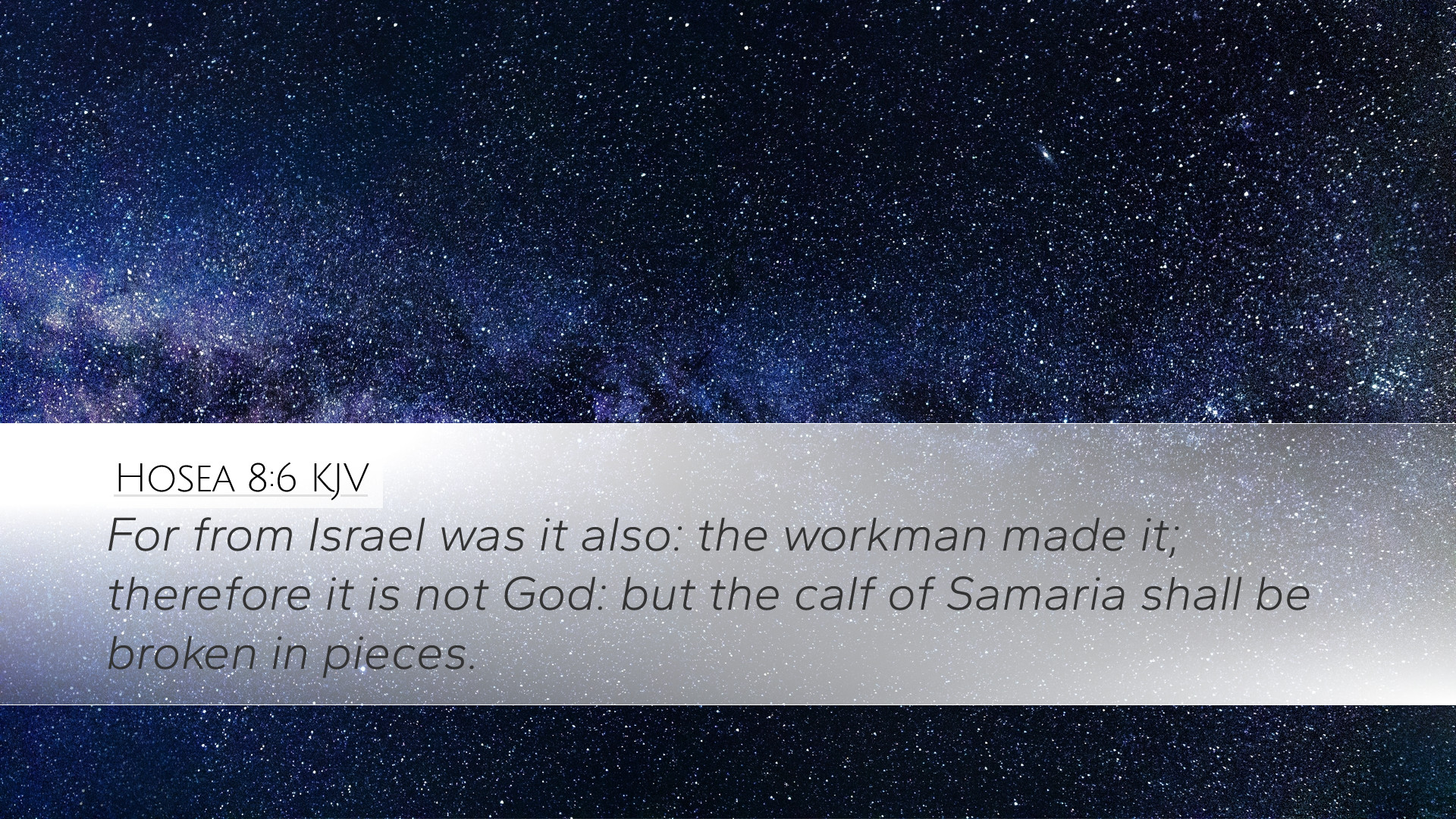Old Testament
Genesis Exodus Leviticus Numbers Deuteronomy Joshua Judges Ruth 1 Samuel 2 Samuel 1 Kings 2 Kings 1 Chronicles 2 Chronicles Ezra Nehemiah Esther Job Psalms Proverbs Ecclesiastes Song of Solomon Isaiah Jeremiah Lamentations Ezekiel Daniel Hosea Joel Amos Obadiah Jonah Micah Nahum Habakkuk Zephaniah Haggai Zechariah MalachiHosea 8:6
Hosea 8:6 KJV
For from Israel was it also: the workman made it; therefore it is not God: but the calf of Samaria shall be broken in pieces.
Hosea 8:6 Bible Commentary
Commentary on Hosea 8:6
Verse Text: "For from Israel was it also: the workman made it; therefore it is not God: but the calf of Samaria shall be broken in pieces."
Introduction
This verse from the Book of Hosea offers profound insight into the nature of idolatry and the consequences of turning away from Yahweh. Hosea, a prophet active during the 8th century BC, addresses the northern kingdom of Israel, warning them of the impending judgement due to their unfaithfulness.
Contextual Background
The backdrop of Hosea's prophetic ministry is a time of significant moral decline in Israel. The nation had succumbed to idolatry, particularly in the worship of the golden calves established by Jeroboam I. This verse explicitly critiques the idolatrous practices that had arisen in Israel, highlighting the futility of relying on man-made gods.
Exegesis of Hosea 8:6
Hosea 8:6 provides a stark admonition regarding the absurdity of idol worship, emphasizing the point that these calves, crafted by human hands, cannot be equated with the Divine. The verse states clearly that the “workman made it; therefore it is not God.”
Analysis by Commentators
-
Matthew Henry
Henry focuses on the futility of idol worship, expressing that developing a calf reflects man's desire to fashion a god in his own image. He elaborates that the calf of Samaria, though created and exalted by the people, lacks the essence of true divinity. The warning here is that God's judgment is imminent against such foolishness.
-
Albert Barnes
Barnes emphasizes the significance of the phrase "is not God," asserting that idols are not worthy of reverence or worship. He points out that the term ‘Samaria’ is emblematic of the rebellion of Israel and the consequences thereof. He notes that while the people placed their trust in these idols, they failed to realize that true strength and deliverance come only from the Lord.
-
Adam Clarke
Clarke provides a historical perspective, mentioning the origin of the golden calves, which were established as a means to prevent the people from returning to Jerusalem for worship. He argues that this perversion of true worship brings destruction, and the statement about the calves being broken underlines the transient nature of human-made deities.
Theological Implications
This verse has several theological implications that resonate through various aspects of Christian doctrine:
- The Nature of God: The direct comparison of the work of man to the divine identity underscores God’s unique and uncreated essence. It emphasizes the belief in monotheism and the singularity of God’s divine character.
- Idolatry as Folly: The folly of idolatry is brought to light. The crafted idols symbolize the human tendency to seek tangible forms of worship, often leading the faithful away from genuine relationship with God.
- Consequences of Disobedience: The imminent judgment alluded to in the verse serves as a warning concerning the ramifications of turning away from God. It invites reflection on the importance of faithfulness and obedience to God’s commands.
Modern Application
For modern readers, especially pastors and scholars, Hosea 8:6 invites a reflective examination of the idols of contemporary culture. The verse challenges believers to identify the areas in life where they may have succumbed to placing trust in ‘calves of Samaria’—whether they be materialism, status, or other distractions that draw people away from God.
Conclusion
Hosea 8:6 serves as a poignant reminder of the danger of idolatry, the futility of human craftsmanship in the realm of spirituality, and the significance of returning to genuine reverence and worship of God. The excerpts from Matthew Henry, Albert Barnes, and Adam Clarke collectively highlight the richness of this scripture, urging readers to examine their hearts and ensure their worship is directed only towards the true God.


